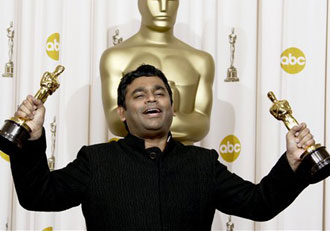Slumdog's A.R. Rahman in High Demand in Hollywood
By wchung | 29 Dec, 2025
Hollywood is finally getting to know A.R. Rahman, the short, humble and deeply religious man who took two Oscars home to southern India for his work on “Slumdog Millionaire.”
In the eight months since Slumdog’s surprise Oscar sweep, Rahman has survived the rage of felicitation that hit him when he returned to India — even the prime minister offered his congratulations — and embarked on countless lunches with studio executives in L.A. eager to match him with that perfect new film.
In between, he’s managed to score two movies, hatched plans with Dave Stewart of Eurythmics to start a band, and is putting together a new solo album.
The Oscars, Rahman said, “got me an identity in the West.”
“There won’t be any doubts looking at me: Who are you? What are you doing here?” he said by phone from Medina, Saudi Arabia. “I don’t have to prove again I can do this and that, and rather can just be cool about my musical statement.”
His latest composition is for “Couple’s Retreat,” a yoga-inflected romantic comedy written, produced by and starring Vince Vaughn, released Friday by Universal Studios.
He spent nearly three months working on “Couple’s Retreat,” first in London and then in L.A.
“L.A. helped me hide,” Rahman said. “I can walk on the streets, which I can’t do in India. I can go to a coffee shop and sit there. I have so much freedom, whereas in India I get mobbed.”
In India, Rahman enjoys a fanatical pop-star fame that stretches from barefoot slum kids playing cricket to the richest matrons of Mumbai. He has won 18 Filmfare Awards, three MTV Awards, and six Tamil Nadu State Awards, among others. In 2000, he was conferred the highest civilian honor in India, the Padma Shri, for his contributions to the film industry.
But that somehow didn’t translate. “Slumdog” did.
Now, Rahman said, he’s not just getting work from Hollywood, he’s getting good work — projects for which he can set his own artistic terms.
“Since the Oscars and all the appreciation, people come for what I am,” he said.
The new album — for Interscope Records, which produced the blockbuster soundtrack to “Slumdog” — is still in its early stages, but Rahman said he hopes to bring together experienced artists like Lady GaGa and M.I.A. with “some really new talents.”
“After ‘Jai Ho’ became number one in 17 countries, they were very excited and said, ‘Why don’t you do a whole album?’” Rahman said.
He keeps working on his pet project: A classical conservatory he opened two years ago in his hometown of Chennai, in southern India. About 130 students are learning the vanishing arts of the viola, violin and acoustic piano. Rahman said he’s also teaching them Indian classical music and electronic composition — the same motley but fortuitous set of skills that holds together his own career.
The “Couple’s Retreat” soundtrack veers from the South Indian Carnatic harmonies of “Undressing” to the hip-hop inflected “NaNa.” Shyam Benegal, an award-winning Indian director — he also got the Padma Shri — who hired Rahman to make music for two of his films, says Rahman has created “a musical bridge.”
“He has bridged the musical distance between the way the Western ear responds and the way the Indian ear responds,” he said. “It’s very difficult to say how.”
The foundations of that bridge were laid when Rahman was a child. After his composer father died, Rahman took up playing the keyboard for movies in south India’s burgeoning Tamil-language film industry. He was just 12.
“I had to work because we had the keyboards,” he said. “My mother said, ‘Why don’t you learn them? It’s such an advantage for you to have them.’”
“I was almost the breadwinner of the family,” he added.
After studying under several masters of classical Indian music, he won a scholarship to the Trinity College of Music in London and took a degree in Western classical music. His break in India came when he was 23 and noted director Mani Ratnam asked him to score his film “Roja.”
Since then he’s worked on over 100 movies in India.
“His fees have gone up a lot,” said director Benegal. “He may be the most expensive composer in India today working on films. That he is. But what he gives to you, even in financial terms, the recovery is almost instantaneous.”
Still, Hollywood’s remunerative embrace could price India’s favorite son out of his home market.
“If he charged me Hollywood rates,” Benegal said, “I wouldn’t be able to pay.”
10/9/2009 6:05 AM ERIKA KINETZ, Associated Press Writer MUMBAI, India

In this Feb. 22, 2009 file photo, A.R. Rahman holds the Oscars for best original score and for best original song "Jai Ho" for his work on "Slumdog Millionaire" during the 81st Academy Awards in the Hollywood section of Los Angeles. (AP Photo/Matt Sayles, file)
Articles
Asian American Success Stories
- The 130 Most Inspiring Asian Americans of All Time
- 12 Most Brilliant Asian Americans
- Greatest Asian American War Heroes
- Asian American Digital Pioneers
- New Asian American Imagemakers
- Asian American Innovators
- The 20 Most Inspiring Asian Sports Stars
- 5 Most Daring Asian Americans
- Surprising Superstars
- TV’s Hottest Asians
- 100 Greatest Asian American Entrepreneurs
- Asian American Wonder Women
- Greatest Asian American Rags-to-Riches Stories
- Notable Asian American Professionals

